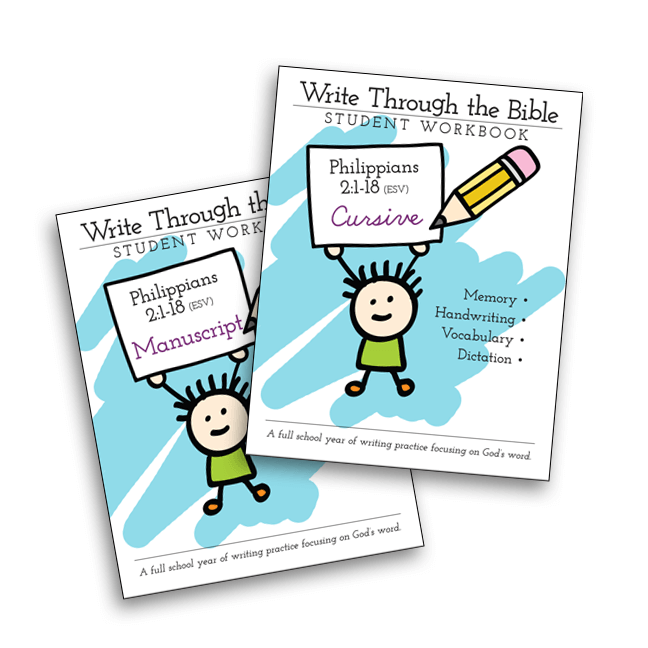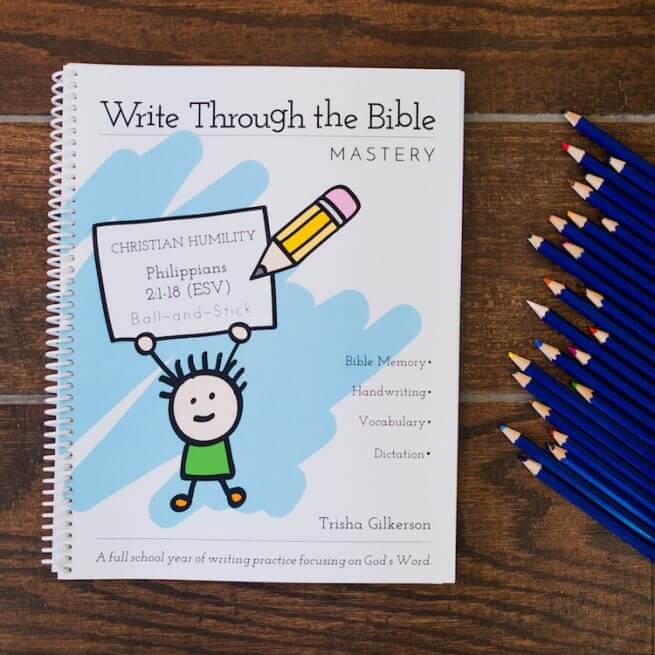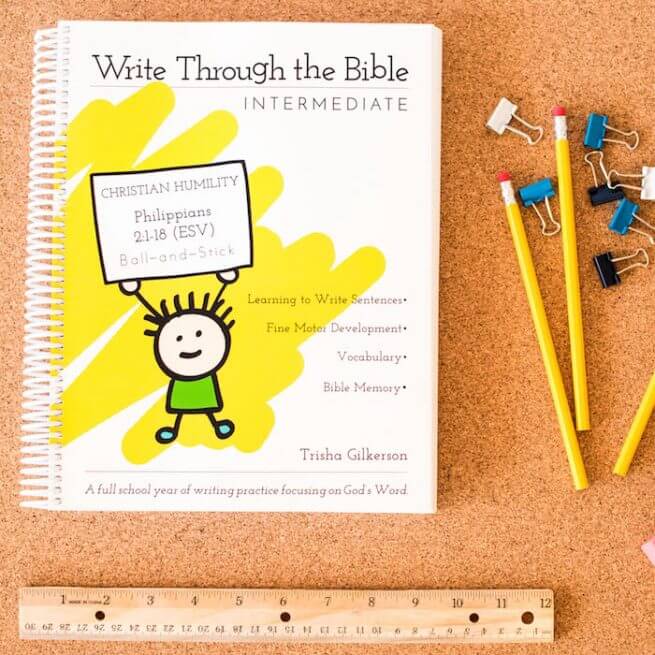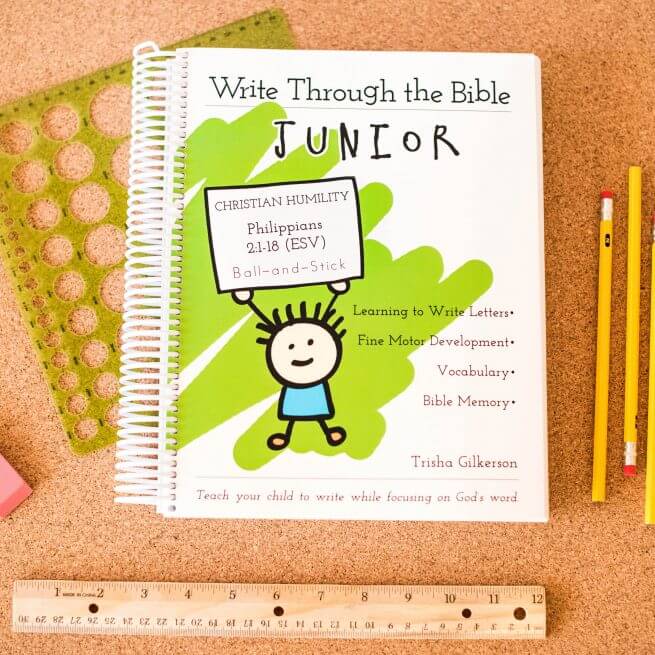In some circles, handwriting practice and good penmanship are lost arts. Modern core curricula, for instance, have removed cursive altogether from public schools.
Public education questions aside, what does handwriting have to do with your child’s spiritual maturity? How is good handwriting connected to your child’s spiritual growth and knowledge of the Word?
Surprisingly, there are many connections…

1. Writing out the Scriptures reminds our kids that each and every word in the Bible is inspired.
God himself wrote the Ten Commandments, etching them in stone with his finger (Exodus 24:12; 31:18; 34:1; Deuteronomy 4:13; 5:22; 9:10). From that time forward, it was clear to God’s people that God’s words were not meant to merely be transmitted orally, but were also meant to be written.
When God inspired the Bible, He didn’t just inspire the ideas in the minds of each prophet; He meaningfully chose each and every word. As each prophet came along, God not only inspired their preaching; He inspired their writings. As Jesus said, every iota, every stroke of the pen in the Bible will be fulfilled (Matthew 5:18).
When our kids take up the discipline of writing God’s words, it reminds them of the exactness of the Bible’s inspiration.
2. Writing out the Scriptures forces our kids to slow down and deliberately think about God’s Word.
When a new king assumed the throne of Israel, he was commanded to create his own handwritten copy of the Law of Moses (Deuteronomy 18:17). He wasn’t just given a copy to read. He didn’t just hire a scribe to do the work for him. He was commanded to write it himself with the oversight of the priests.
Imagine the diligence it would take to write out all 304,805 Hebrew letters of the Law—a practice that a modern scribe takes about a year to complete! This forced the new king to devote himself to the slow, careful reading of God’s Word at the beginning of his kingship.
When our kids take up the discipline of writing God’s words, it forces them really pay attention to what God has written.
3. Writing out the Scriptures equips our children to become great students (and even teachers) of the Word.
Jesus told His disciples, “Therefore every scribe who has been trained for the kingdom of heaven is like a master of a house, who brings out of his treasure what is new and what is old” (Matthew 13:52). In Jesus’ day a “scribe” was noble trade of religious teachers, and at the heart of their profession was writing out the Law and teaching it to others. Jesus here is calling for His apostles to become Christians leaders who are diligent students of both the Old and New covenants.
When our kids take up the discipline of writing God’s words, it prepares them to become a “scribe” for the kingdom of God—to become a Christian leader.
4. Writing out the Scriptures helps our kids become better readers of the Word.
Ethna Reid, director of the private Reid School, says the most common reason students have difficulty reading is poor “visual memory.” She insists, handwriting is an important skill “because it creates visual memory and develops visual recall”—helping children recognize different letters quickly, thus helping them to become good readers.
When our kids write the words of God, it acquaints them with the vocabulary of the Bible, making them stronger readers of the Word.
5. Writing out the Scriptures helps our kids in memorizing the words of God.
Virginia Berninger, a professor of educational psychology at the University of Washington, says printing, cursive handwriting, and typing on a keyboard are all associated with separate areas of the brain. When children learn cursive, this activates massive brain regions involved in thinking, language, and working memory. Pam Mueller of Princeton and Daniel Oppenheimer of the University of California, Los Angeles, has demonstrated that students learn better when they take notes by hand—as they write, they reflect on the information and reframe it, which can lead to better memory encoding in the brain.
When our kids write out the words of God, take notes during a sermon, or maintain a prayer journal, it builds up their brains so they can better retain what God says in His Word.
Handwriting Practice and Bible Memory: An All-in-One Workbook
A few years ago, my wife developed a workbook for our oldest son that would help him not only practice his penmanship, but would also help him memorize a longer passage of Scripture we were memorizing as a family. This has since spawned a whole line of products called Write Through the Bible along with a product for younger students just learning to write Write Through the Bible: Junior.
The workbooks are designed to help students move a passage of Scripture into their longterm memory.
Also, instead of just having students hop around from verse to verse, the books dwell on a lengthier passage of Scripture for an entire school year.













I definitely know that writing out what I’m reading helps me think about what I’m reading more. Not just with the scriptures, so maybe it’s just how my brain works. If I’m organizing my thoughts about something, I instinctively grab a piece of paper and something to write with.
#titus2tuesday
Thank you, Luke, for encouraging Scripture memorization and for these great tips! May I suggest another helpful way to memorize Scripture? It is the app Bible Memory: Remember Me. Quizzes, flashcards, audio recording, playback and an intelligent review system help you to memorize your favourite verses from 44 Bible versions. It’s so easy to use it is even part of Google Play for Families.